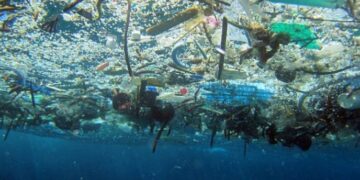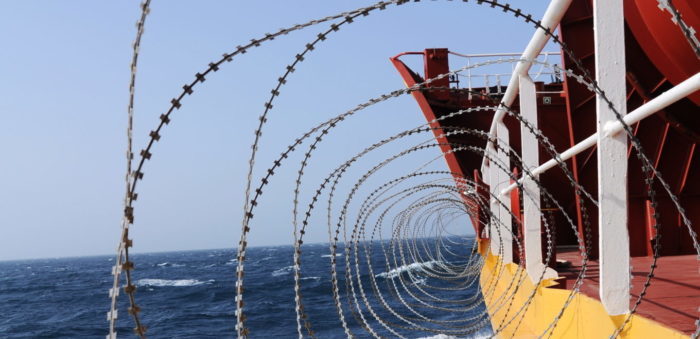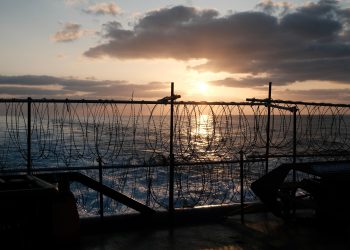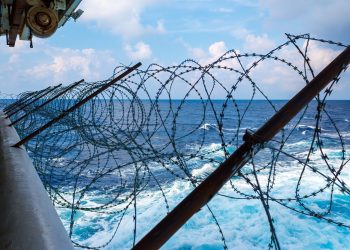Mr. Jakob P. Larsen, Head of Maritime Security at BIMCO, provides an overview of the status of maritime security in the piracy affected areas around the world, citing possible reasons for the escalation of piracy in the GoG. In addition, Mr. Larsen highlights that industry should not be complacent with the lower activity reported in Somalia. Overall, industry can mitigate the risk by following the BMP5 guidance and changing its mindset by constantly improving its risk mitigation techniques, such as examining integrated security features for future ship designs, and addressing shared reporting of piracy incidents.
SAFETY4SEA: What is currently the biggest challenge in maritime security from your perspective?
Jakob P. Larsen: There are several important security issues on the agenda, but I think the single most important issue the industry faces is the piracy in the Gulf of Guinea. Judging from statistics, the problem has been escalating these past few weeks. This may be because we get closer the 2019 Nigerian general election, where past years’ piracy trend has traditionally been upward, for whatever reason.
Another important issue on the agenda is the developing situation in the Red Sea, where the conflict in Yemen occasionally spills over to the maritime domain. In this regard, it is important not to dramatize the risks to shipping. It is mainly warships and shipping interests with ties to countries in the Saudi-led coalition that are at risk. Other commercial shipping mainly face a smaller risk of getting caught in the middle of hostilities. Such collateral damage can be serious enough, but the risk is smaller and can be managed if following the existing guidance in BMP5.
S4S: Regarding piracy, latest OBP report unveiled that the situation in the Gulf of Guinea hasn’t been improved while Somalia’s piracy comeback is notable, after a five-year hiatus. What are your views with respect to the state of maritime security in Somalia?
J.P.L: In the waters off Somalia we have seen a small number of reports where shipping has been attacked, but we have not seen a successful boarding of a larger commercial vessel since the boarding and subsequent failed kidnap attempt on the bulk carrier OS 35 in April 2017 in the Gulf of Aden. Since then, apparent piracy activity has been sporadic with only very few incidents reported. The current low levels of Somali piracy activity is a testament to the success of the international cooperation on areas such as ship protection, naval intervention, arrest and prosecution and establishing of alternative livelihoods for would-be pirates. But this success is still reversible, and if we allow complacency to set in and remove all risk mitigation, it is likely that the problem will come back again in force.
S4S: What is the overall situation in the hottest piracy spots with respect to piracy figures? Is the number lower or under reported? Do you believe that there is a need for addressing the issue further from a regulatory perspective?
J.P.L: There is a persistent claim in the industry, that many piracy incidents especially in the Gulf of Guinea region goes unreported. If true, this may have something to do with the nature of the petroleum industry where safety and security concerns are typically higher on the agenda than in other industries. The positive impact this has had on safety and security records cannot be overstated, but in such a business environment, a company with a poor security record can eventually lose business, and this is unfortunately an incentive to under-report. More regulation is not the answer to this problem. Regulation is already in place which puts a reporting responsibility on the industry and on flag states. Rather, what is needed is a change of mindset so that shared reporting is seen as something that saves lives and benefits all, and that in reality, national or commercial interests will only rarely warrant that information sharing is restricted.
S4S: When do you think, we as an industry will be in a position to assume that the piracy threat is insignificant and why?
J.P.L: I am afraid that we will probably never get to a point where the piracy threat is insignificant. Human nature is such that there will always be criminals that try to prey on ships transporting valuable cargoes and seafarers vulnerable to kidnap. What we must do as an industry is to constantly improve our risk mitigation techniques. For example, I am sure that there are some low-hanging fruits to be picked when it comes to integrated security features for future ship designs. I am not talking about turning ships into fortresses, but simply remembering to also take basic security considerations into account during the design phase can make a valuable yet inexpensive difference. I hope that improved risk mitigation measures together with the previously mentioned change of mindset can help suppress the piracy risk even more than today.
S4S: What do you think should be industry’s priority to move forward?
J.P.L: Over the years, the industry with Navy partners have moved forward together in several areas. Together, we have come far in terms of developing guidance, sharing information and tackling specific problems like off Somalia. We should continue to strengthen this relationship and the joint efforts in a meaningful way, and importantly, we in the industry shall remain vigilant and not allow complacency to set in when things seem to be going a little better.
 Jakob P. Larsen is the Head of Maritime Security at BIMCO – the World’s largest shipowner association with more than 2,100 members globally. Within his scope are all matters related to maritime security including piracy, drug smuggling, war, terrorism, stowaways, mixed mass migration and cyber security. In addition to maintaining a close dialogue with governments and international organizations, the role includes assisting members with all aspects of maritime security.
Jakob P. Larsen is the Head of Maritime Security at BIMCO – the World’s largest shipowner association with more than 2,100 members globally. Within his scope are all matters related to maritime security including piracy, drug smuggling, war, terrorism, stowaways, mixed mass migration and cyber security. In addition to maintaining a close dialogue with governments and international organizations, the role includes assisting members with all aspects of maritime security.
Jakob’s career began in 1990 in the Danish Navy, where he pursued a seagoing career as navigator and surface warfare officer. Commissioned in 1995 as Lieutenant, key assignments included service as Commanding Officer of Arctic Patrol Vessel, Operations Officer in frigates, and Staff Operations Officer in NATO’s Standing Naval Force Atlantic. Subsequent shore staff assignment included service in the Defence General Staff and in the Ministry of Defence.
A Commander of four years seniority, in 2010 Jakob left the Danish Navy to become Maritime Security Officer in BIMCO. In 2013, after three successful years in BIMCO, he changed over to Nordic Tankers where he expanded his responsibilities over time to become Head of HSSEQ. In 2015 Jakob went to Maersk Line to become Global Security & Marine QA Manager. During his time in Nordic Tankers and Maersk Line, he managed a number of different security challenges all over the World, including operating small tankers and container ships in and out of the Niger Delta, pirate attacks, kidnaps, assassinations, office evacuations, drug smuggling and stowaways.
Jakob is a Master Mariner and Command & Staff Course graduate of the Danish Defence Academy (2006).
The views presented hereabove are only those of the author and not necessarily those of SAFETY4SEA and are for information sharing and discussion purposes only.





























































